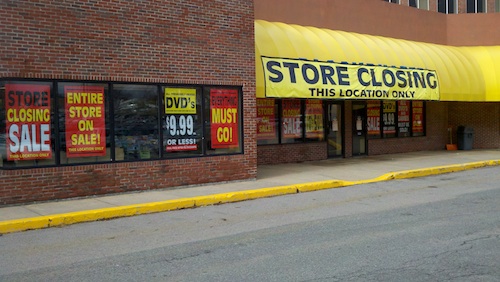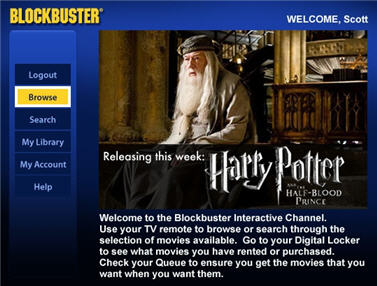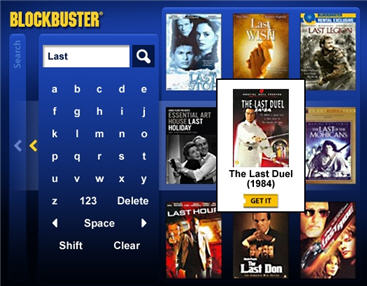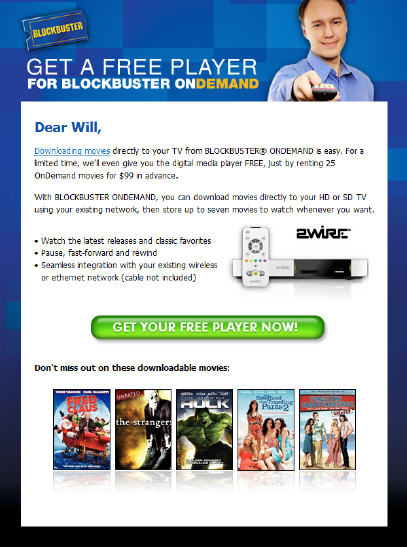-
Blockbuster Adds Streaming Content, But Still Only Available to Dish Subscribers
Dish Network made a series of announcements today (enhanced HBO on demand access, whole-home DVR, bundled satellite broadband with ViaSat, expanded Univision distribution), but the one that caught my eye focused on increased video selection for its "Blockbuster@Home" online service, a new brand name which looks like it will replace the "Blockbuster Movie Pass" brand that Dish unveiled back in September. Specifically, Dish said it has added 3,000 titles targeted to kids ages 3-13 with partners Vivendi Entertainment, Cookie Jar, Lions Gate and Scholastic Media.
Categories: Aggregators, Satellite
Topics: Blockbuster, DISH
-
With Recent Deals, OTT Distributors' Content Strategies Are Crystallizing
Amid the drama and headlines surrounding OTT distributors (e.g. Netflix price increases and Qwikster decision, on-again/off-again Hulu sale, etc.), these companies' content strategies actually seem to be crystallizing, with each trying to stake out a somewhat distinct value proposition for their users. True, there is still plenty of blurriness between them, and each appears reluctant to be pigeon-holed, but recent deals suggest how each OTT distributor is positioning itself.
Below is a summary of the content strategies of most of the major OTT distributors (Netflix, Hulu, Amazon, YouTube, Walmart/VUDU, iTunes and Blockbuster) with a catchphrase that best describes their approach:
Categories: Aggregators
Topics: Amazon, Blockbuster, Hulu, iTunes, Netflix, VUDU, YouTube
-
Winners and Losers Due to Netflix's Decision to Split DVDs
Netflix's bizarre decision to separate its DVD business from its streaming business will have significant ramifications for the video ecosystem. Below are some of the clear winners, potential winners and clear losers.
Categories: Aggregators
Topics: Amazon, Apple, Blockbuster, DISH, Facebook, Google, Hulu, Netflix, Redbox, VUDU, YouTube
-
Former Blockbuster CEO and Investor Square Off Over Company's Failure
Coincidentally, as I was writing "Could HBO be the Next Blockbuster?" an essay appeared in Harvard Business Review this week by former Blockbuster CEO John Antioco describing his experience at the company and interactions with activist investor Carl Icahn. After the essay Icahn responds, to which Antioco then responds. It's a fascinating exchange.
Categories: Aggregators
Topics: Blockbuster, Netflix
-
Blockbuster Staggers to a Sale
The wrangling over what should become of Blockbuster's carcass seemed to reach a resolution yesterday as the judge presiding over the company's bankruptcy approved its proposed auction process. For those who haven't been following the drama, potential acquirers - mostly a group of hedge funds - have been fighting with movies studios that are Blockbuster's creditors, over the company's fate, with some recently calling for an outright liquidation.
The Blockbuster story is a cautionary tale about what happens when companies don't pay attention to changing market conditions. No company was better positioned, and with a better brand, than Blockbuster, to take advantage of the shift to digital distribution. But Blockbuster was slow to adapt, its strategy and execution were flawed, and it had the bad luck of running into an extremely capable upstart in Netflix.
Here's a picture of the last Blockbuster in my area I snapped earlier this week; I'm guessing you've witnessed this scene in your neighborhood as well. You gotta love the irony of the tag line "THIS LOCATION ONLY."
Categories: Deals & Financings
Topics: Blockbuster, Netflix
-
6 Things Pay-TV Operators Can Learn From Blockbuster's Fall
Blockbuster's bankruptcy filing was a long time in coming, but is still daunting when you think back to how omnipresent and powerful the company used to be. To be sure, there has been a lot of distracting M&A and corporate drama surrounding Blockbuster over the years which no doubt contributed to its decline. Still, there have been fundamental shifts in its business that Blockbuster missed.
Specifically, Netflix has been both a catalyst of Blockbuster's demise and also a big beneficiary. Now, with Netflix aggressively pursuing over-the-top streaming, it is inevitably going to put pressure on traditional pay-TV operators. So what might pay-TV operators learn from Blockbuster's bankruptcy? Here are 6 things. No doubt there are more.
Categories: Aggregators
Topics: Blockbuster, Netflix
-
Blockbuster Hangs In with New Fox, Sony and Warner Deals
Netflix wasn't the only distributor modifying how it does business with Hollywood studios this week; Blockbuster also unveiled new deals with Fox, Sony and Warner, giving it "day-and-date" availability of these studios' films for store and mail rental (note, not for its on demand streaming service). Blockbuster also got "enhanced payment terms" from the studios in exchange for giving them a first lien on Blockbuster's Canadian assets (which would imply that if Blockbuster files for bankruptcy, the studios could end up owning/operating a slew of Canadian stores). Seems like steep terms for Blockbuster to hang in there.
for store and mail rental (note, not for its on demand streaming service). Blockbuster also got "enhanced payment terms" from the studios in exchange for giving them a first lien on Blockbuster's Canadian assets (which would imply that if Blockbuster files for bankruptcy, the studios could end up owning/operating a slew of Canadian stores). Seems like steep terms for Blockbuster to hang in there.
As I wrote a few weeks ago in "The Battle Over Movie Rentals is Intensifying," there are multiple distributors jockeying to be the consumer's preferred movie source. That means consumers need to figure out, on a title by title basis what works best for them.
For example, I'm a Netflix subscriber and let's say I want to watch the recently released "Sherlock Holmes" DVD. Netflix doesn't get it until April 27th per its 28-day window with Warner Bros. But when I check online, a local Blockbuster store I've never been to shows that it's in stock (though I'm a little skeptical). Do I want to drive down there to find out? Meanwhile, Comcast is offering it on-demand. But do I want to pay $4.99 for it when I'm already paying a monthly Netflix subscription? Alternatively, there's iTunes and Amazon VOD. But then I need to either watch on my computer or on the TV that's hooked to the Roku or temporarily connect my laptop to the TV. See what I mean about the choices facing consumers?
(Note - online movie distribution is among the topics we'll cover at the next VideoSchmooze on April 26th. Early bird discounted tickets available for just one more week!)
What do you think? Post a comment now (no sign-in required).
Categories: Aggregators, FIlms, Studios
Topics: Blockbuster, FOX, Netflix, Sony, Warner Bros.
-
Potential Blockbuster Bankruptcy Another Reminder of Changed Movie Landscape
In case you missed it, this week Blockbuster, the once dominant movie rental chain, filed its 10K annual report with the SEC, in which it warned of "substantial doubt about our ability to continue as a going concern," continuing on to say it may seek relief through a bankruptcy filing. A filing has been rumored for a while now, but until its annual report, Blockbuster has resisted acknowledging this path.
Aside from whatever else can be said about Blockbuster in recent years - vast over-expansion, poor financial management, slowness to respond to new competitors like Netflix and Redbox - the company's potential bankruptcy is surely one of the most vivid reminders of how much the movie rental industry has changed in the last 10 years and how much it is yet to change in the next 10 years. Blockbuster will likely be remembered as a temporary player that drove wider movie access in the analog era, but then got crushed as rentals shifted in the digital era. The separate news this week of cable operators and studios beginning to vigorously promote VOD shows cable operators are determined not to be left behind, like Blockbuster has been, as the next chapter of movie rentals unfolds.
competitors like Netflix and Redbox - the company's potential bankruptcy is surely one of the most vivid reminders of how much the movie rental industry has changed in the last 10 years and how much it is yet to change in the next 10 years. Blockbuster will likely be remembered as a temporary player that drove wider movie access in the analog era, but then got crushed as rentals shifted in the digital era. The separate news this week of cable operators and studios beginning to vigorously promote VOD shows cable operators are determined not to be left behind, like Blockbuster has been, as the next chapter of movie rentals unfolds.
What do you think? Post a comment now (no sign-in required)Categories: Aggregators, Deals & Financings
Topics: Blockbuster
-
ActiveVideo Networks Helping Blockbuster on Demand Deliver a Converged Experience
Amid all of the attention Netflix has been receiving for embedding its streaming software in one consumer electronics device after another (the Wii just yesterday) and its recent Warner Bros. deal, it's been easy to overlook the fact that Blockbuster has been getting some online traction itself. One announcement at CES last week, by ActiveVideo Networks, caught my attention as it has the potential to leapfrog Blockbuster On Demand's user experience past Netflix's Watch Instantly.
Much as I'm a big fan of Netflix's Watch Instantly streaming feature, one of its limitations is that the user experience is very segregated between computer and TV. You browse and search online for titles - just as you would for DVDs - and then when you've made your choices, they show up in your Instant Queue online and on your connected TV (via Roku, Blu-ray, Xbox or other device). While it's a perfectly functional approach, wouldn't it be nice if you could do the entire process of search, discovery, previewing, selection and viewing on the TV itself?
That's the experience that ActiveVideo Networks' CloudTV will be helping Blockbuster on Demand deliver to its users. As ActiveVideo's CEO Jeff Miller explained to me yesterday, when deployed, the Blockbuster on Demand app (developed using ActiveVideo's JavaScript/HTML authoring kit), will give Blockbuster's users a web-like experience of search, discovery and previewing on their TVs, via connected devices. In addition, it will present viewing options - streaming, download-to-own and in-store rental (via an API it will even show current availability in selected stores).
The requirements are that ActiveVideo's thin client has been integrated with the device, and that Blockbuster has its own deal with to distribute through the specific device manufacturer. Navigation is via the remote control using an on-screen keypad (see example screen shots below from last week's CES demos).

 To date, Blockbuster has announced CE device deals with Samsung, 2Wire, and through its deal with Sonic Solutions, the ecosystem of devices already working with Roxio CinemaNow, such as TiVo. For now, that's small in comparison to Netflix's constellation of device partners, but it's still early in the convergence game. Outside of CE devices - and in a case of somewhat strange bedfellows - Blockbuster is also focused on cable operators. It recently announced partnership deals with top 10 cable operators Suddenlink and Mediacom to enhance their VOD offerings.
To date, Blockbuster has announced CE device deals with Samsung, 2Wire, and through its deal with Sonic Solutions, the ecosystem of devices already working with Roxio CinemaNow, such as TiVo. For now, that's small in comparison to Netflix's constellation of device partners, but it's still early in the convergence game. Outside of CE devices - and in a case of somewhat strange bedfellows - Blockbuster is also focused on cable operators. It recently announced partnership deals with top 10 cable operators Suddenlink and Mediacom to enhance their VOD offerings.Similarly, ActiveVideo is also focused both on CE (currently through a partnership with middleware provider Videon Central) and on cable. It has deployed on set-top boxes with Cablevision and Oceanic Time Warner Cable in Hawaii, reaching an audience of 5 million homes. Content providers that have developed apps include Showtime, HSN and Fox, among others. No doubt ActiveVideo and Blockbuster will synch up their biz dev activities to proliferate the Blockbuster on Demand app as widely as possible.
I have to admit that I haven't been paying too much attention to Blockbuster, as it has worked to re-position itself, aiming to close another 1,000 stores by the end of the year and installing more kiosks to compete with Redbox. Of course, it can ill afford to allow Netflix to get too far out in front of it in digital delivery as DVD rentals are poised to be supplanted by streaming down the road.
But Blockbuster has an ubiquitous, if somewhat dated, brand that could be skillfully leveraged into the digital era, provided it has the right services in its arsenal. In this respect, the potential to bring a converged user experience between online and connected TVs is a meaningful differentiator. No initial joint customers have yet been announced by Blockbuster and ActiveVideo, though I expect that soon. And, as online video and TV continue to converge, ActiveVideo is likely to find itself in the middle of a lot of action. All of this is worth keeping an eye on.
Update: Looks like I'm 1 step behind on Netflix's Xbox implementation. Apparently in Aug '09 it was updated to allow full browsing and search for the Watch Instantly catalog. I'm used to the Roku and Blu-ray experiences. Hat tip to Brian Fitzgerald for bringing to my attention.
What do you think? Post a comment now.(Note - ActiveVideo Networks is a VideoNuze sponsor)
Categories: Aggregators, Devices, FIlms, Partnerships
Topics: ActiveVideo Networks, Blockbuster, Mediacom, Netflix, Suddenlink, Videon
-
Blockbuster Follows Netflix Onto TiVo Boxes; Ho-Hum
Blockbuster and TiVo have announced that Blockbuster OnDemand movies will be available on TiVo devices. Though I'm all for creating more choice for viewers to gain access to the content they seek, in this
 case I don't see the deal creating a ton of new value in the market, as it comes 6 months after Netflix and TiVo announced that Netflix's Watch Instantly service would be available on TiVo devices and nearly 2 years after Amazon and TiVo made Amazon's Unbox titles available for purchase and download to TiVo users. It looks like the main differentiator here is that Blockbuster will begin selling TiVos in their network of physical stores.
case I don't see the deal creating a ton of new value in the market, as it comes 6 months after Netflix and TiVo announced that Netflix's Watch Instantly service would be available on TiVo devices and nearly 2 years after Amazon and TiVo made Amazon's Unbox titles available for purchase and download to TiVo users. It looks like the main differentiator here is that Blockbuster will begin selling TiVos in their network of physical stores. The deal underscores the flurry of partnership activity now underway (which I think will accelerate) between aggregators/content providers and companies with some kind of device enabling broadband access to TVs. I believe the key to these deals actually succeeding rests on 2 main factors: the content offering some new consumer value (selection, price, convenience, exclusivity, etc.) and the access device gaining a sufficiently large footprint. Absent both of these, the new deals will likely find only limited success.
Consumers now have no shortage of options to download or stream movies, meaning that announcements along the lines of Blockbuster-TiVo break little new ground. To me, a far more fertile area to create new consumer value is offering online access to cable networks' full-length programs. As I survey the landscape of how premium quality video content has or has not moved online, this is the category that has made the least progress so far. That's one of the reasons I think the recent Comcast/Time Warner Cable plans are so exciting.
With these plans in the works, but no timetables yet announced, non-cable operators need to be thinking about how they too can gain select distribution rights. There's still a lot of new consumer value to be created in this space. Given lucrative existing affiliate deals between cable networks and cable/satellite/telco operators, I admit this won't be easy. However, Hulu's access to Comedy Central's "Daily Show" and "Colbert Report" does prove it's possible.
We're well into the phase where premium video content is delivered to TVs via broadband. Those that bring distinctive content to large numbers of consumers as easily as possible will be the winners.
What do you think? Post a comment now.
Categories: Aggregators, Devices, FIlms, Partnerships
Topics: Amazon, Blockbuster, Comcast, Netflix, Time Warner Cable, TiVo
-
Blockbuster Online with New 2Wire MediaPoint Player Has a Tough Climb Ahead
Have you received the email pitch from Blockbuster Online yet, to rent 25 movies and get the new 2Wire MediaPoint Digital Media Player "free?" I've received a couple already this week (see below), and after reviewing the offer and its details, and comparing it to other alternatives, my conclusion is that the new service has a tough climb ahead.

The new 2Wire box itself is in the same general family as other single-purpose boxes such as AppleTV, Vudu and Netflix's Roku. There are some differences among them in hard drive size, pricing, outputs and streaming vs. downloading orientation. But they all serve the same basic purpose: connecting you via your home broadband connection to one source of "walled garden" premium-quality video content.
VideoNuze readers know I've been quite skeptical of the standalone box model, especially when box prices start in the $200-300 range. There's no question there's an upscale, early adopter audience that will buy in, but mainstream consumers will be uninterested for all kinds of reasons including: financial considerations (especially in this economy), resistance to connecting another box in already crowded consoles, perceived technical complexity, strong existing substitutes (e.g. cheap ubiquitous DVD players) and indistinct value propositions.
My judgment is based on a pretty simple set of criteria I rely on to gauge a new product or service's likelihood of success: Does it offer meaningful new value (some combination of better price, quality or speed) with minimal adoption effort required? Can a large target audience for this new value be clearly defined, served and acquired in an economically-reasonable manner? Is this new value attainable without sacrificing meaningful benefits of existing alternatives?
Miss on any one of these and the odds of success lengthen. Miss on any two and you're in long-shot territory. Miss on all three and you're dead on arrival. After evaluating the Blockbuster Online/MediaPoint current offer, my sense is that it misses on at least two and possibly all three.
Value: As explained below, for certain movies renters, the offer is valuable. It provides convenience at a relatively low financial commitment for the new device. But explaining these benefits just to the relevant target audience at an economic cost per acquisition is going to be nearly impossible. I'm dubious that even in-store promotions - which on the surface seem Blockbuster's strength - will work. First, there may be franchisee issues, as there were with previous "Total Access" promotions. And second, Blockbuster has closed so many stores in prime target neighborhoods - due to the rise of Netflix and other options eroding their business - that they'll be missing many prospects (example: in my upscale home town of Newton, MA there is not a single Blockbuster store left).
Audience: There's only one real target audience I can see for this offer, and it seems very narrow to me: low-volume renters of movies only, who are not iTunes users. Think about it - if you rent a lot of movies, you've likely been subscribing to Netflix for years (more so if you also rent TV shows). If you want to own your content instead of rent it, then you buy DVDs or maybe more recently have been buying digital version, most likely with iTunes primarily. If that's the case, then when it comes to watching on TV, you're going to buy an Apple TV (even then, few have done so to date), not a 2Wire MediaPoint. The eligible target audience left for Blockbuster/MediaPoint seems pretty slim.
Sacrificing existing benefits: Inevitably all digital distribution options need to be compared to the incumbent DVD format, which is remarkably strong (no wonder a billion units have been shipped to date). Against the DVD standard, Blockbuster/MediaPoint is inferior in a number of ways: limited viewing windows (the usual online limitations of 24 hour expiration after starting, and 30 day automatic file deletion), no portability to view rented movies on other TVs not connected to a MediaPoint, no TV shows available for rent, and at this point, smallish storage that only keeps up to 5 movies at a time.
Add it all up, and it's a pretty daunting set of issues. To be sure, much of this isn't specific to Blockbuster. To succeed, all new digital delivery options must be mindful of the above criteria as well.
What do you think? Post a comment now.
Categories: Aggregators, Devices
Topics: 2Wire, AppleTV, Blockbuster, Netflix, VUDU
-
Blockbuster Movies on Mobile Handsets? No Way.
A piece of news that emerged about Blockbuster courting mobile handset makers to make movies available strikes me as wrong-headed. And note this is from someone who's sometimes been accused of being insufficiently critical of even the most new-fangled video delivery concepts.

However, this idea stretches the mind too far. Watching a 2 hour movie on a mobile handset's tiny screen. How many people are going to be willing to do that? And to run their battery down for this pleasure? Not many is my guess. Not to mention that mobile content is all about short-form, bite-sized chunks. You know - you find yourselves with 5-10 minutes of downtime waiting for your plane, your kid or your coffee. So watch some news or sports clips. But a whole movie? Forget it.
These days people are so enthusiastic about broadband and mobile as opening up new market opportunities that they often focus too quickly on the technology-based, "Cool, we can really do this?" question, instead of the consumer-based, "Is there really a need to be filled?" question. My bet is that more of the latter and less of the former will lead to success. Hopefully Blockbuster will realize this soon and not waste too many cycles on this idea.
Categories: Aggregators, FIlms, Mobile Video
Topics: Blockbuster
Posts for 'Blockbuster'
|


